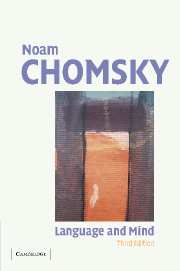Book contents
- Frontmatter
- Contents
- Preface to the third edition
- Preface to the second edition
- Preface to the first edition
- 1 Linguistic contributions to the study of mind: past
- 2 Linguistic contributions to the study of mind: present
- 3 Linguistic contributions to the study of mind: future
- 4 Form and meaning in natural languages
- 5 The formal nature of language
- 6 Linguistics and philosophy
- 7 Biolinguistics and the human capacity
- Index
2 - Linguistic contributions to the study of mind: present
Published online by Cambridge University Press: 04 September 2012
- Frontmatter
- Contents
- Preface to the third edition
- Preface to the second edition
- Preface to the first edition
- 1 Linguistic contributions to the study of mind: past
- 2 Linguistic contributions to the study of mind: present
- 3 Linguistic contributions to the study of mind: future
- 4 Form and meaning in natural languages
- 5 The formal nature of language
- 6 Linguistics and philosophy
- 7 Biolinguistics and the human capacity
- Index
Summary
One difficulty in the psychological sciences lies in the familiarity of the phenomena with which they deal. A certain intellectual effort is required to see how such phenomena can pose serious problems or call for intricate explanatory theories. One is inclined to take them for granted as necessary or somehow “natural.”
The effects of this familiarity of phenomena have often been discussed. Wolfgang Köhler, for example, has suggested that psychologists do not open up “entirely new territories” in the manner of the natural sciences, “simply because man was acquainted with practically all territories of mental life a long time before the founding of scientific psychology … because at the very beginning of their work there were no entirely unknown mental facts left which they could have discovered.” The most elementary discoveries of classical physics have a certain shock value – man has no intuition about elliptical orbits or the gravitational constant. But “mental facts” of even a much deeper sort cannot be “discovered” by the psychologist, because they are a matter of intuitive acquaintance and, once pointed out, are obvious.
There is also a more subtle effect. Phenomena can be so familiar that we really do not see them at all, a matter that has been much discussed by literary theorists and philosophers. For example, Viktor Shklovskij in the early 1920s developed the idea that the function of poetic art is that of “making strange” the object depicted.
- Type
- Chapter
- Information
- Language and Mind , pp. 21 - 56Publisher: Cambridge University PressPrint publication year: 2006



